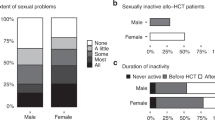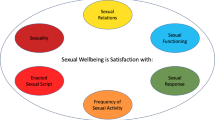Abstract
The majority of adult patients have sexual concerns after post-haematopoietic cell transplantation. Even so, health-care professionals (HCP) do not routinely discuss these problems. We, therefore, surveyed all the members of the European Society for Blood and Marrow Transplantation to evaluate the barriers and facilitators to discussing sexual issues. The 73-item web-survey was completed by 166 registered nurses (RNs) and 126 medical doctors (MDs). Sixty-eight percent reported that they seldom discussed sexual issues. Younger MDs (p < 0.001) and those who work in non-western European countries (p = 0.003), RNs with probably less sexual education themselves (p = 0.002), MDs and RNs who have limited knowledge about sexual complications (p < 0.001) and MDs and RNs who feel uncomfortable discussing sexual issues (p < 0.001) are all less likely to discuss these matters. The major perceived barriers were that patients might be embarrassed if sexual issues were discussed in the presence of a relative (60% RNs, 67% MDs) and that professionals prefer patients to raise sexual issues themselves (54% RNs, 44% MDs). The most important perceived facilitator was for the patient to initiate discussion (≥ 90% for RNs and MDs). Overall, haematopoietic cell transplantation survivors may not be receiving the support on sexual issues they probably need.
This is a preview of subscription content, access via your institution
Access options
Subscribe to this journal
Receive 12 print issues and online access
$259.00 per year
only $21.58 per issue
Buy this article
- Purchase on Springer Link
- Instant access to full article PDF
Prices may be subject to local taxes which are calculated during checkout
Similar content being viewed by others
References
Haukvik UK, Dieset I, Bjøro T, Holte H, Fosså SD. Treatment-related premature ovarian failure as a long-term complication after Hodgkin’s lymphoma. Ann Oncol. 2006;17:1428–33.
Levine J, Canada A, Stern CJ. Fertility preservation in adolescents and young adults with cancer. J Clin Oncol. 2010;28:4831–41.
van der Kaaij MA, Heutte N, Meijnders P, Abeilard-Lemoisson E, Spina M, Moser EC, et al. Premature ovarian failure and fertility in long-term survivors of Hodgkin’s lymphoma: a European Organisation for Research and Treatment of Cancer Lymphoma Group and Groupe d’Etude des Lymphomes de l’Adulte Cohort Study. J Clin Oncol. 2012;30:291–9.
Howell SJ, Shalet SM. Testicular function following chemotherapy. Hum Reprod Update. 2001;7:363–9.
Behringer K, Breuer K, Reineke T, May M, Nogova L, Klimm B, et al. German Hodgkin’s Lymphoma Study Group. Secondary amenorrhea after Hodgkin’s lymphoma is influenced by age at treatment, stage of disease, chemotherapy regimen, and the use of oral contraceptives during therapy: a report from the German Hodgkin’s Lymphoma Study Group. J Clin Oncol. 2005;23:7555–64.
Podnar S, Vodušek DB. Sexual dysfunction in patients with peripheral nervous system lesions. Handb Clin Neurol. 2015;130:179–202.
Mueller SM, Haeusermann P, Rovó A, Halter JP, Passweg J, Itin P, et al. Genital chronic GVHD in men after hematopoietic stem cell transplantation: a single-center cross-sectional analysis of 155 patients. Biol Blood Marrow Transplant. 2013;19:1574–80.
Wong FL, Francisco L, Togawa K, Kim H, Bosworth A, Atencio L, et al. Longitudinal trajectory of sexual functioning after hematopoietic cell transplantation: impact of chronic graft-versus-host disease and total body irradiation. Blood. 2013;122:3973–81.
Ciavattini A, Clemente N. Female genital tract chronic graft-versus-host disease: review of the literature. Anticancer Res. 2015;35:13–7.
Tierney DK. Sexuality following hematopoietic cell transplantation. Clin J Oncol Nurs. 2004;8:43–7.
Mosher CE, Redd WH, Rini CM, Burkhalter JE, DuHamel KN. Physical, psychological, and social sequelae following hematopoietic stem cell transplantation: a review of the literature. Psychooncology. 2009;18:113–27.
Tierney DK. Sexuality: a quality-of-life issue for cancer survivors. Semin Oncol Nurs. 2008;24:71–9.
Watson M, Wheatley K, Harrison GA, Zittoun R, Gray RG, Goldstone AH, et al. Severe adverse impact on sexual functioning and fertility of bone marrow transplantation, either allogeneic or autologous, compared with consolidation chemotherapy alone: analysis of the MRC AML 10 trial. Cancer. 1999;86:1231–9.
Claessens JJ, Beerendonk CC, Schattenberg AV. Quality of life, reproduction and sexuality after stem cell transplantation with partially T-cell-depleted grafts and after conditioning with a regimen including total body irradiation. Bone Marrow Transplant. 2006;37:831–6.
Humphreys CT, Tallman B, Altmaier EM, Barnette V. Sexual functioning in patients undergoing bone marrow transplantation: a longitudinal study. Bone Marrow Transplant. 2007;39:491–6.
Syrjala KL, Kurland BF, Abrams JR, Sanders JE, Heiman JR. Sexual function changes during the 5 years after high-dose treatment and hematopoietic cell transplantation for malignancy, with case-matched controls at 5 years. Blood. 2008;111:989–96.
Thygesen KH, Schjødt I, Jarden M. The impact of hematopoietic stem cell transplantation on sexuality: a systematic review of the literature. Bone Marrow Transplant. 2012;47:716–24.
Majhail NS, Rizzo JD. Surviving the cure: long term followup of hematopoietic cell transplant recipients. Bone Marrow Transplant. 2013;48:1145–51.
Katz A. The sounds of silence: sexuality information for cancer patients. J Clin Oncol. 2005;23:238–41.
Hordern A. Intimacy and sexuality after cancer: a critical review of the literature. Cancer Nurs. 2008;31:E9–17.
Kotronoulas G, Papadopoulou C, Patiraki E. Nurses’ knowledge, attitudes, and practices regarding provision of sexual health care in patients with cancer:critical review of the evidence. Support Care Cancer. 2009;17:479–501.
Bevans M. Health-related quality of life following allogeneic hematopoietic stem cell transplantation. Hematol Am Soc Hematol Educ Program.2010;2010:248–54.
Braamse AM, van Meijel B, Visser O, Huijgens PC, Beekman AT, Dekker J. Distress, problems and supportive care needs of patients treated with auto- or allo-SCT.Bone Marrow Transplant. 2014;49:292–8.
Hughes MK. Sexuality and the cancer survivor: a silent coexistence. Cancer Nurs. 2000;23:477–82.
Thaler-DeMers D. Intimacy issues: sexuality, fertility, and relationships. Semin Oncol Nurs. 2001;17:255–62.
Park ER, Norris RL, Bober SL. Sexual health communication during cancer care: barriers and recommendations. Cancer J. 2009;15:74–7.
Bober SL, Recklitis CJ, Campbell EG, Park ER, Kutner JS, Najita JS, et al. Caring for cancer survivors: a survey of primary care physicians. Cancer. 2009;115:4409–18.
Bekker M, Beck J, Putter H, van Driel M, Pelger R, Lycklama, et al. The place of female sexual dysfunction in the urological practice: results of a Dutch survey. J Sex Med. 2009;6:2979–87.
Lindau ST, Surawska H, Paice J, Baron SR. Communication about sexuality and intimacy in couples affected by lung cancer and their clinical-care providers. Psychooncology. 2011;20:179–85.
Ussher JM, Perz J, Gilbert E, Wong WK, Mason C, Hobbs K, et al. Talking about sex after cancer: a discourse analytic study of health care professional accounts of sexual communication with patients. Psychol Health. 2013;28:1370–90.
Vermeer WM, Bakker RM, Stiggelbout AM, Creutzberg CL, Kenter GG, ter Kuile MM. Psychosexual support for gynecological cancer survivors: professionals’ current practices and need for assistance. Support Care Cancer. 2015;23:831–9.
Wilson ME, Williams HA. Oncology nurses’ attitude and behaviors related to sexuality of patients with cancer. Oncol Nurs Forum. 1988;15:49–53.
Gamel C, Hengeveld M, Davis B. Informational needs about the effects of gynaecological cancer on sexuality: a review of the literature. J ClinNurs. 2000;9:678–88.
Magnan MA, Reynolds KE, Galvin EA. Barriers to addressing patient sexuality in nursing practice. Medsurg Nurs. 2005;14:282–9.
Zeng YC, Li Q, Wang N, Ching SS, Loke AY. Chinese nurses’ attitudes and beliefs toward sexuality care in cancer patients. Cancer Nurs. 2011;34:E14–20.
Zeng YC, Liu X, Loke AY. Addressing sexuality issues of women with gynaecological cancer: Chinese nurses’ attitudes and practice. J Adv Nurs. 2012;68:280–92.
Moore A, Higgins A, Sharek D. Barriers and facilitators for oncology nurses discussing sexual issues with men diagnosed with testicular cancer. Eur J Oncol Nurs.2013;17:416–22.
Oskay U, Can G, Basgol S. Discussing sexuality with cancer patients: oncology nurses attitudes and views. Asian Pac J Cancer Prev. 2014;15:7321–6.
Traa MJ, De Vries J, Roukema JA, Rutten HJ, Den Oudsten BL. The sexual health care needs after colorectal cancer: the view of patients, partners, and healthcare professionals. Support Care Cancer. 2014;22:763–72.
Krouwel EM, Nicolai MP, van Steijn-van Tol AQ, Putter H, Osanto S, Pelger RC, et al. Addressing changed sexual functioning in cancer patients: A cross-sectional survey among Dutch oncology nurses. Eur J Oncol Nurs. 2015;19:707–15.
Flynn KE, Reese JB, Jeffery DD, Abernethy AP, Lin L, Shelby RA, et al. Patient experiences with communication about sex during and after treatment for cancer. Psychooncology. 2012;21:594–601.
Sauermann H, Roach M. Increasing web survey response rates in innovation research: An experimental study of static and dynamic contact design features. Res Policy. 2013;42:273–86.
Hartmann U, Burkart M. Erectile dysfunctions in patient-physician communication: optimized strategies for addressing sexual issues and the benefit of using a patient questionnaire. J Sex Med. 2007;4:38–46.
Stead ML, Brown JM, Fallowfield L, Selby P. Lack of communication between healthcare professionals and women with ovarian cancer about sexual issues. Br J Cancer. 2003;88:666–71.
Berry DL, Blumenstein BA, Halpenny B, Wolpin S, Fann JR, Austin-Seymour M, et al. Enhancing patient-provider communication with the electronic self-report assessment for cancer: A randomized trial. J Clin Oncol. 2011;29:1029–35.
Reese JB, Keefe FJ, Somers TJ, Abernethy AP. Coping with sexual concerns after cancer: The use of flexible coping. Support Care Cancer. 2010;18:785–800.
Reese JB. Coping with sexual concerns after cancer. Curr Opin Oncol. 2011;23:313–21.
Hatzichristou D, Rosen RC, Broderick G, Clayton A, Cuzin B, Derogatis L, et al. Clinical evaluation and management strategy for sexual dysfunction in men and women. J Sex Med. 2004;1:49–57.
Hatzichristou D, Rosen RC, Derogatis LR, Low WY, Meuleman EJ, Sadovsky R, et al. Recommendations for the clinical evaluation of men and women with sexual dysfunction. J Sex Med.2010;7:337–48.
Zhou ES, Nekhlyudov L, Bober SL. The primary health care physician and the cancer patient: tips and strategies for managing sexual health. Transl Androl Urol. 2015;4:218–31.
Annon JS. The PLISSIT model: a proposed conceptual scheme for the behavioral treatment of sexual problems. J Sex Ed & Ther. 1976;2:1–15.
Butler L, Banfield V. Oncology nurses’ views on the provision of sexual health in cancer care. J Sex Reprod Med. 2001;1:35–9.
Lavin M, Hyde A. Sexuality as an aspect of nursing care for women receiving chemotherapy for breast cancer in an Irish context. Eur J Oncol Nurs. 2006;10:10–8.
Hautamäki K, Miettinen M, Kellokumpu-Lehtinen PL, Aalto P, Lehto J. Opening communication with cancer patients about sexuality-related issues. Cancer Nurs. 2007;30:399–404.
Author information
Authors and Affiliations
Corresponding author
Ethics declarations
Conflict of interest
The authors declare that they have no conflict of interest.
Electronic supplementary material
Rights and permissions
About this article
Cite this article
Eeltink, C.M., Witte, B.I., Stringer, J. et al. Health-care professionals’ perspective on discussing sexual issues in adult patients after haematopoietic cell transplantation. Bone Marrow Transplant 53, 235–245 (2018). https://doi.org/10.1038/s41409-017-0027-y
Received:
Revised:
Accepted:
Published:
Issue Date:
DOI: https://doi.org/10.1038/s41409-017-0027-y
This article is cited by
-
Feasibility and effectiveness of communication tools for addressing intimacy and sexuality in patients with cancer: a systematic review
Supportive Care in Cancer (2024)
-
Sexual function of adult long-term survivors and their partners after allogeneic hematopoietic cell transplantation in Europe (S-FAST): a study from the Transplant Complications Working Party and Nurses Group of the EBMT
Bone Marrow Transplantation (2023)
-
Non-physician’s challenges in sexual and reproductive health care provision for women of reproductive age with cancer: a scoping review of barriers and facilitators
Supportive Care in Cancer (2022)
-
Sexual problems in patients with hematological diseases: a systematic literature review
Supportive Care in Cancer (2022)
-
Male-specific late effects in adult hematopoietic cell transplantation recipients: a systematic review from the Late Effects and Quality of Life Working Committee of the Center for International Blood and Marrow Transplant Research and Transplant Complications Working Party of the European Society of Blood and Marrow Transplantation
Bone Marrow Transplantation (2022)



